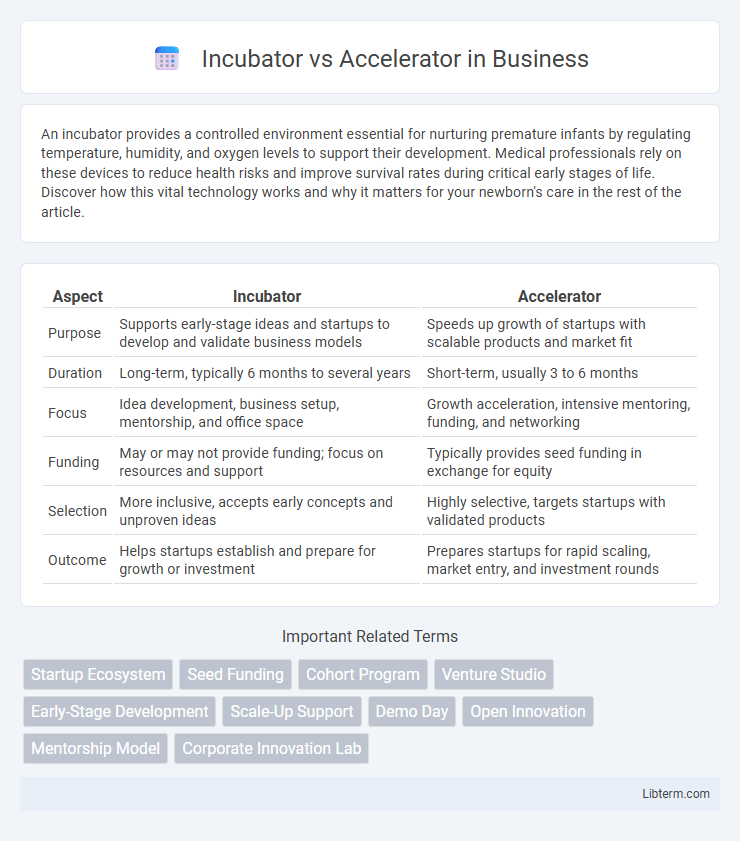An incubator provides a controlled environment essential for nurturing premature infants by regulating temperature, humidity, and oxygen levels to support their development. Medical professionals rely on these devices to reduce health risks and improve survival rates during critical early stages of life. Discover how this vital technology works and why it matters for your newborn's care in the rest of the article.
Table of Comparison
| Aspect | Incubator | Accelerator |
|---|---|---|
| Purpose | Supports early-stage ideas and startups to develop and validate business models | Speeds up growth of startups with scalable products and market fit |
| Duration | Long-term, typically 6 months to several years | Short-term, usually 3 to 6 months |
| Focus | Idea development, business setup, mentorship, and office space | Growth acceleration, intensive mentoring, funding, and networking |
| Funding | May or may not provide funding; focus on resources and support | Typically provides seed funding in exchange for equity |
| Selection | More inclusive, accepts early concepts and unproven ideas | Highly selective, targets startups with validated products |
| Outcome | Helps startups establish and prepare for growth or investment | Prepares startups for rapid scaling, market entry, and investment rounds |
Understanding Startup Incubators
Startup incubators provide early-stage companies with essential resources such as office space, mentorship, and access to funding to nurture business ideas in their initial development phases. These programs typically offer long-term support, lasting from several months to years, allowing startups to refine their products, validate market fit, and build sustainable business models. Unlike accelerators, incubators focus more on creation and foundational growth rather than rapid scaling or time-limited intensive programs.
What Are Accelerators?
Accelerators are fixed-term, cohort-based programs designed to rapidly scale startups through intensive mentorship, education, and access to investors. They provide seed funding, extensive networking opportunities, and hands-on guidance to help early-stage companies refine their business models and accelerate market entry. Unlike incubators, accelerators emphasize fast growth and typically culminate in a demo day where startups pitch to potential investors.
Key Differences Between Incubators and Accelerators
Incubators provide early-stage startups with long-term support, including workspace, mentorship, and resources, often without strict deadlines, fostering idea development and gradual growth. Accelerators offer intensive, time-limited programs focused on rapid scaling, mentorship, and access to investment, culminating in a demo day to attract potential investors. The key differences lie in duration, program structure, funding opportunities, and stage of startup maturity targeted.
Types of Support Provided
Incubators offer long-term support including office space, mentorship, business services, and access to funding, often targeting early-stage startups to nurture idea development. Accelerators provide intensive, short-term mentorship, seed funding, networking opportunities, and demo days aimed at rapidly scaling startups with proven business models. Both types of programs emphasize tailored guidance but differ primarily in duration, funding structure, and growth stage focus.
Duration and Program Structure
Incubators typically offer long-term support spanning several months to a few years, providing early-stage startups with flexible, open-ended access to resources, mentorship, and office space. Accelerators run fixed-term programs, usually lasting three to six months, designed to rapidly scale startups through intensive mentorship, batch-based cohorts, and demo days for investor exposure. The structured, time-bound nature of accelerators contrasts with the more extended, adaptive approach of incubators focused on early business development.
Funding Opportunities: Incubators vs Accelerators
Incubators typically provide early-stage startups with seed funding, mentorship, and access to shared resources over an extended period, helping founders develop viable business models. Accelerators offer more structured, time-limited programs, often investing capital in exchange for equity while facilitating rapid growth and preparing startups for subsequent venture capital funding. Funding opportunities in incubators are generally more flexible and long-term, whereas accelerators focus on intensive, milestone-driven investments aimed at scaling startups quickly.
Ideal Candidates for Each Program
Incubators cater to early-stage startups or entrepreneurs seeking guidance, resources, and mentorship to develop and validate their business ideas over an extended period. Accelerators target startups with a minimum viable product (MVP) and some market traction, aiming to rapidly scale their operations, refine business models, and secure investment within a fixed, intense program duration. Ideal candidates for incubators typically require foundational support and business exploration, while accelerator participants benefit from fast-paced growth strategies and networking opportunities.
Pros and Cons of Incubators
Incubators offer startups extended support with resources such as office space, mentoring, and networking opportunities, fostering early-stage development in a low-pressure environment. However, the longer duration and less structured programs may slow growth compared to accelerators, and funding is often limited or indirect. Entrepreneurs benefit from tailored guidance and community support but may face challenges due to slower speed-to-market and varying levels of access to investor networks.
Advantages and Disadvantages of Accelerators
Accelerators provide startups with intense mentorship, access to investor networks, and structured programs designed for rapid growth, which significantly enhance early-stage company scaling opportunities. However, accelerators often require equity stakes and operate on fixed timelines, which may pressure startups to prioritize short-term milestones over long-term sustainability. The competitive selection process and high expectations can also limit participation to startups with already strong potential, leaving early or riskier ideas less supported.
Choosing the Right Program for Your Startup
Choosing the right program for your startup depends on your current stage and specific needs, with incubators typically suited for early-stage ventures seeking mentorship, workspace, and foundational development support, while accelerators focus on rapid growth through intensive guidance, funding, and networking opportunities. Incubators usually provide longer-term, flexible support without strict timelines, ideal for refining ideas and business models, whereas accelerators operate on fixed schedules with cohorts aiming for scalability and investor readiness. Evaluating factors like program duration, resources, equity requirements, and industry fit helps entrepreneurs align their goals with the optimal environment for growth and success.
Incubator Infographic

 libterm.com
libterm.com